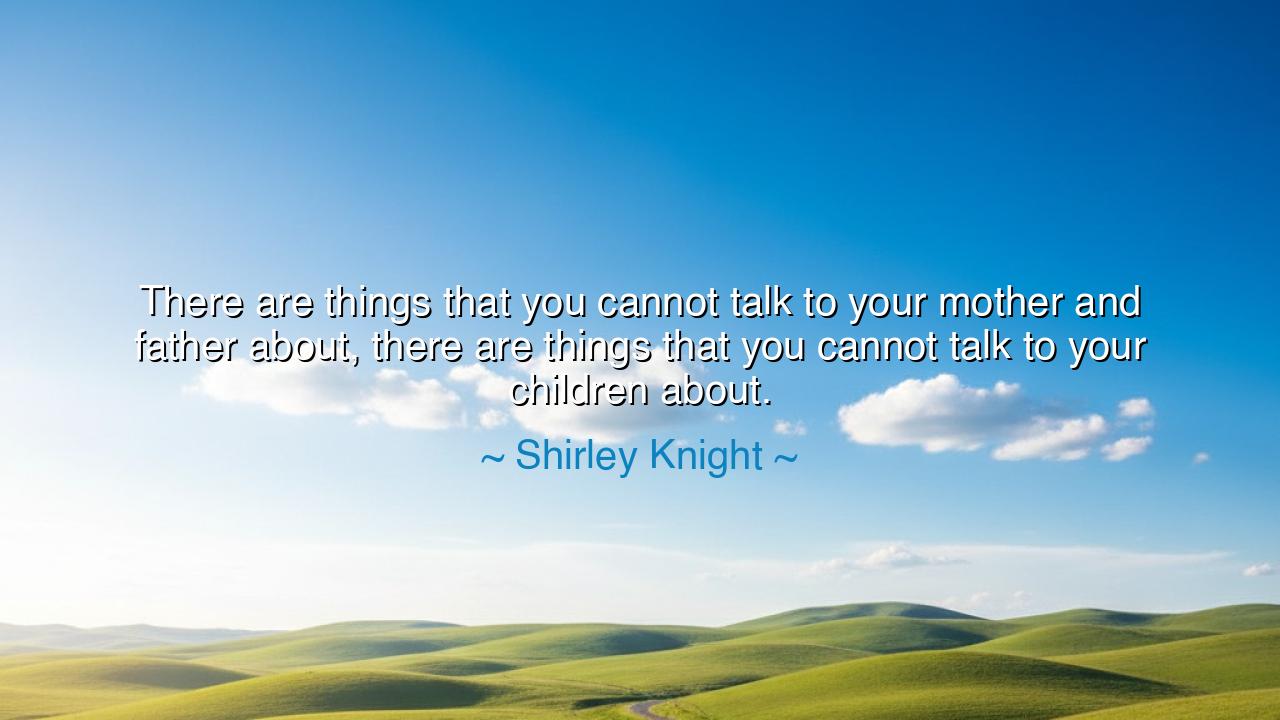
There are things that you cannot talk to your mother and father
There are things that you cannot talk to your mother and father about, there are things that you cannot talk to your children about.






Host: The room was quiet, the soft light of the lamp casting a warm glow across the table. Outside, the world had settled into the peaceful stillness of the evening. Jeeny sat at the table, her fingers lightly tracing the rim of her cup, deep in thought. Jack, standing near the window, gazed out at the darkened world, absorbed in reflection. The quiet between them felt comfortable, but there was an unspoken sense that their conversation was about to take on a more profound tone.
Jeeny: (breaking the silence, her voice calm but reflective) “I came across something by Shirley Knight today that really struck me. She said, ‘There are things that you cannot talk to your mother and father about, there are things that you cannot talk to your children about.’ What do you think about that?”
Jack: (pauses, his voice thoughtful) “It’s such a simple yet profound statement, isn’t it? Knight is touching on the complexity of family relationships and how there are boundaries even within the closest of connections. It’s almost like she’s saying that there are some things—experiences, thoughts, emotions—that we just can’t share with our family, because of the roles they play in our lives. We often have expectations of who can understand us, but those expectations sometimes create limitations in what we can openly discuss.”
Jeeny: (nodding slowly) “Exactly. It’s a reminder that even with the people we love most, there are walls we can’t easily break down. With our parents, we may feel like we can’t share certain aspects of our adult lives because of the way they see us or the expectations they have. With our children, it might be about protecting them from the complexities of life, or not wanting to burden them with our own struggles. Knight is highlighting how we sometimes have to keep certain parts of ourselves hidden, even from the people closest to us.”
Host: The stillness in the room deepened as the conversation unfolded. Jack turned slightly toward Jeeny, his expression softening as he considered the broader meaning of Knight’s words. Outside, the world had quieted, but inside, the conversation had turned inward, reflecting on the complexity of relationships and the unspoken boundaries that sometimes exist within families.
Jack: (his voice quieter now, more introspective) “What strikes me is how universal this experience is. We all have secrets, or things we choose not to share, even with those who love us most. It’s not necessarily about hiding the truth—it’s about protecting certain aspects of ourselves, or about maintaining some sense of autonomy. Maybe it’s about not wanting others to see us as vulnerable or maybe it’s just the difficulty of being truly understood. There’s a certain privacy that comes with being human, and it’s part of what makes us individuals.”
Jeeny: (softly) “Yes, and it’s about the boundaries we create to navigate the complexity of our relationships. With our parents, there may always be a sense of them seeing us as their child, no matter how much we’ve grown or changed. With our children, it’s about protecting their innocence, or not wanting to burden them with the emotional weight of our adult experiences. Knight’s words make me think about how, even in the closest of families, we sometimes have to manage what we share and how much we allow others to see.”
Jack: (nodding slowly) “Exactly. And I think that’s why family relationships are so intricate. They’re built on love and connection, but also on unspoken boundaries that we sometimes don’t even recognize until we’re faced with something we can’t share. It’s about knowing where those boundaries lie and respecting them, even when we feel the urge to cross them.”
Jeeny: (smiling gently) “Yes, it’s about recognizing that vulnerability can’t always be shared, even with the people we love the most. There’s a kind of protection in that. It’s not about keeping secrets for the sake of keeping secrets—it’s about preserving a sense of self, and sometimes, some parts of us are just not meant to be understood by others, even those closest to us.”
Host: The quiet in the room seemed to grow deeper now, as the conversation continued to unfold. Outside, the world had quieted, but inside, there was a shared understanding about the complexity of relationships and the delicate balance between connection and privacy within families. Jeeny and Jack had uncovered a deeper truth in Knight’s words—that even in the closest relationships, there are boundaries that define what we can and cannot share, and that those boundaries are a part of what makes us human.
Jack: (smiling softly, his voice more assured) “It’s a reminder that relationships are complicated. We love deeply, but there’s also this personal space that we need to keep to ourselves, to protect our sense of identity and autonomy.”
Jeeny: (nodding warmly) “Exactly. And that’s part of the beauty of family—the love and connection are always there, even if there are things we can’t always share. It’s about respecting each other’s boundaries and understanding that sometimes, the most meaningful connections are those that don’t require complete openness.”
Host: The world outside had quieted to a peaceful stillness, but inside, the room was filled with understanding. Jeeny and Jack had uncovered the truth in Knight’s words—that even in the closest family relationships, there are boundaries we create that protect our sense of self and our vulnerability. These boundaries are not about withholding love, but about preserving the complexity and individuality of each person. The night continued outside, but inside, the room felt full of the realization that, in families, love often exists in the space between the things we can and cannot say.






AAdministratorAdministrator
Welcome, honored guests. Please leave a comment, we will respond soon